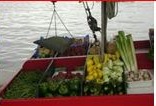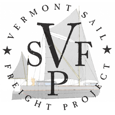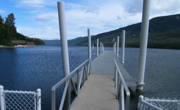 Interview with Andrew Willner of HARVEST - Harbor and River Vessel Transport Company Editor's note: Andrew Willner is a key environmental activist for the New York City region, with a long track record in conservation and political alliances. Baykeeper and the Waterkeeper Alliance are prestigious groups he has helped lead that have been templates for other regions' progress. |
|||
Editor's introduction: This analysis deftly reveals how our cities physically and culturally changed to accommodate commerce, technology and economies of scale to the detriment of communities' livelihoods. Alice Friedemann spent many years in the shipping business (ships), and since retirement has ratcheted up her critique of the corporate economy's distribution system as she explores peak oil. Her previous articles have focused on "Peak Soil", and the "Financial Monsters" we face as economic reality catches up with endless growth.- Jan Lundberg Book Review: Mark Levinson: The Box. How the Shipping Container Made the World Smaller and the World Economy Bigger. Princeton University Press, 2006.Mark Levinson has written a book that shows how containers made global trade possible. In the preface of the paperback edition, he notes other aspects of containerization he became aware of later, such as the potential for containers to harbor atomic weapons, how they’ve become homes, and so on. To me, what Levinson leaves out is how this global distribution system will make it very difficult to go back to local production as energy declines. He doesn’t mention that containerization was the fastest way yet for capitalism to loot the planet and strip Mother Earth down to her hard dry skin. |
|||
-- a voice in Berlin with an update on the new age of sail What a place, what a time: Berlin's transition from a hard winter to a welcome summer. No time for springtime; we've all arrived at the global warming cook off. Who wants to contemplate such a thing? Yet, posing that question has a purpose here, to tell of progress on Culture Change's sail transport transition. The backdrop of Berlin is significant as a unique city of keen interest to those involved in social change and who are chafing in more stressful urban scenes. |
|||
 How a group of farmers, high school students, and community Imagine boarding a flat-bottomed sailing barge for a 300-mile voyage from the shores of Lake Champlain to New York harbor. The hold is laden with twelve tons of locally produced wheat, flour, dry beans, maple syrup, apples, cabbages, and hard cider. This is not a historic re-enactment. This is the future! |
|||
Source: Peak Moment Television |
|||
|
|||
 Sailing wine Holland-Denmark
Here's the good word for you on the progression of Culture Change: Our work is zeroing in on an historic contribution to global infrastructure change. I believe you'll have a clear idea on why you should support it, if you don't already. (You can do it by here: donating here) You recall how we saved healthy land with our campaign for a road building moratorium for over a decade, and educated the public. In the past few years you've noticed our growing emphasis on sail transport. |
|||
 Sail Transport Network, by Clark Beek, founder of Wine By Sail
Editor's note: |
|||
Are traditional sail boats the future of trade? |
|||
 The last month has seen exciting U.S. sail-transport developments. Three encouraging events indicate that the nation may no longer be falling behind Europe in nurturing a critical form of renewable energy. In northern Europe at least four well-established players are operating on a significant scale, and preparing to build more ships. Previous reports this summer on SailTransportNetwork.com have discussed these entities' exciting voyages and plans for new vessels. |
|||


